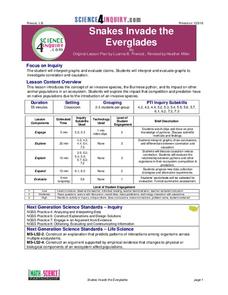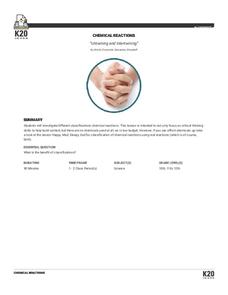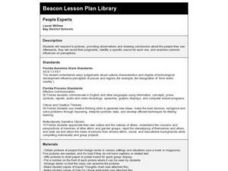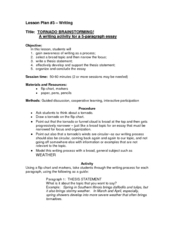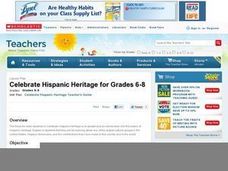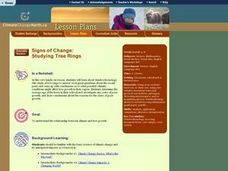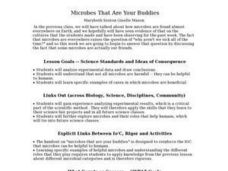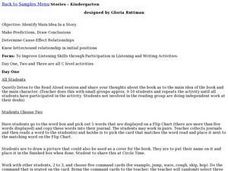Science 4 Inquiry
Snakes in the Everglades
The Burmese python is on the loose ... and he's hungry! Illustrate the differences between causative and correlative relationships through an inquiry lesson. Pupils examine several sources of information to determine if there is a...
EngageNY
Special Lines in Triangles (part 1)
Allow your pupils to become the mathematicians! Individuals explore the properties of a midsegment of a triangle through construction and measurement. Once they figure out the properties, learners use them to draw conclusions.
Nevada Outdoor School
Let It Snow! Let It Melt!
Winter weather offers a great opportunity to teach young scientists about the states of matter. This activity-based lesson includes a range of learning experiences, from experimenting with the rate at which ice melts to singing a song...
Discovery Education
Make it all Better!
Discover how innovations can help your school and community. In the three-part STEM lesson, scholars learn the meaning of innovation and brainstorm innovations in their schools. They identify issues in their communities and think of...
K20 LEARN
Untwining And Intertwining: Chemical Reactions
What happened when the chemistry teacher told a bad joke? There was no reaction! A creative take on the traditional reaction types lesson invites learners to draw their own conclusions about how compounds and elements combine. Groups...
University of Colorado
The Moons of Jupiter
Can you name the three planets with rings in our solar system? Everyone knows Saturn, many know Uranus, but most people are surprised to learn that Jupiter also has a ring. The third in a series of six teaches pupils what is around...
Facing History and Ourselves
Why Little Things Are Big
Often our decisions are impacted by a fear of how others see us. That's the big idea in a two-day instructional activity that asks how false assumptions, how our fear of how others may see us, impact how we act. After watching a video...
Texas Education Agency (TEA)
Distinguishing Between Inductive and Deductive Reasoning (English III Reading)
Is Sherlock Holmes an inductivist or a deductivist? Users of this interactive to distinguish between inductive and deductive reasoning. They consider in various situations whether it is better to list evidence and then introduce a claim...
Curated OER
People Experts
Students examine pictures of people and draw conclusions about them. Using worksheets, students take a second look and carefully examine the pictures to determine what influenced their perceptions.
Curated OER
Annie's Gifts: comprehension skills
In this comprehension skills instructional activity, students read the book Annie's Gifts and complete comprehension activities. Students complete 5 activities including problem/solution, setting, making predictions, making inferences,...
Curated OER
The Life of George Washington Carver: comprehension skills
In this comprehension skills activity, learners read the book The Life of George Washington Carver and complete comprehension activities. Students complete 5 activities including note taking, making inferences, and drawing conclusions.
Curated OER
What's My Job?: comprehension skills
In this comprehension skills learning exercise, 2nd graders read the book What's My Job? and complete comprehension activities. Students complete 5 activities including setting, character traits, summarizing, main idea/details, and...
Curated OER
Arriba Amigos!
Students explore how culture effects our world. In this culture lesson, students work in groups to do a web quest. Students gather and analyze information to decide if Mayan ruins should be destroyed to build a shopping center. Students...
Curated OER
Animation Pre-Production
Does your class love reading cartoons? Use their talents and interests to examine the process of writing a story they wish to tell through a cartoon. They develop the beginning, middle, and end of a story based on their original...
Curated OER
Tornado Brainstorming
While the focus of this lesson is on writing about tornadoes, any topic could be substituted. The lesson provides a well-thought out overview of the writing process. Learners come up with a thesis statement, supporting details, and a...
Curated OER
When A Story Met A Sandwich
How is a story like a peanut butter and jelly sandwich? Use making a sandwich as a metaphor to remind your writers that a good, solid beginning, a rich and rewarding middle, and an ending that brings everything together spices up a...
Curated OER
Air, Air Everywhere! Lesson 2: Acid Rain
Middle school environmentalists record the pH of four different liquids, including two aerosol cleaning products. They liken the products to acid rain and speculate in writing which might affect the human respiratory system. Although...
Curated OER
Teach Inferences in a Systematic and Engaging Way
Benefit from specially designed materials to help you teach inference in a systematic and rewarding way!
Curated OER
Celebrate Hispanic Heritage: Grades 6-8
To gain a better understanding of Hispanic heritage and culture, as well as to build informational comprehension skill, learners explore facets of Hispanic American History. They engage in a class discussion, research three facts, and...
Curated OER
Signs of Change: Tree Rings
Students identify and experiment with dendrochronology (the study of tree rings to answer ecological questions about the recent past) and come up with conclusions as to what possible climatic conditions might affect tree growth in their...
Curated OER
Microbes That Are Your Buddies - Biology Teaching Thesis
Students analyze experimental data and draw conclusions. They are able to comprehend that not all microbes are harmful--they can be helpful to humans. Students are able to comprehend specific examples of cases in which microbes are...
Curated OER
The Good and Bad Bacteria
High schoolers are able to name one kind of harmful bacteria and why it hurts us and also name one kind of helpful bacteria and how we use it. They describe the process of growing bacterial cultures in a lab. Students create a reasonable...
Curated OER
A Closer look at Oil and Energy Consumption
Upper graders analyze basic concepts about the consumption, importation and exportation of the worlds oil production. They create several graphs to organize the data and draw conclusions about the overall use of oil in the world.
Curated OER
Identify Main Idea in a Story
Help your kindergarteners identify the main idea in a story. Small groups work with the teacher to make predictions and draw conclusions. They are able to determine cause and effect relationships. The lesson is divided into several days,...


